 W
WJames Barron was an officer in the United States Navy. He served in the Quasi-War and the Barbary Wars, during which he commanded a number of famous ships, including USS Essex and USS President. As commander of the frigate USS Chesapeake, he was involved in the Chesapeake–Leopard affair in 1807 which led to the surrender of his ship to the British and resulted in him being court-martialed for his actions during incident. After criticism from some fellow officers, the resulting controversy led Barron to a duel with Stephen Decatur, one of the officers who presided over his court-martial. Suspended from command, he pursued commercial interests in Europe during the War of 1812. Barron finished his naval career on shore duty, becoming the Navy's senior officer in 1839.
 W
WJohn Barry was an Irish-American officer in the Continental Navy during the American Revolutionary War and later in the United States Navy. He has been credited as "The Father of the American Navy" and was appointed a captain in the Continental Navy on December 7, 1775. He was the first captain placed in command of a U.S. warship commissioned for service under the Continental flag.
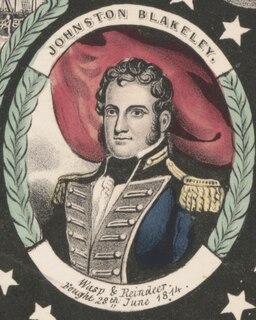 W
WJohnston Blakeley also spelled Johnston Blakely was an officer in the United States Navy during the Quasi-War with France and the War of 1812. He is considered to be one of the most successful American naval officers of that period.
 W
WWilliam Ward Burrows I was the second Commandant of the Marine Corps. His son, William Ward Burrows II, was a decorated officer in the United States Navy.
 W
WJames R. Caldwell was an officer in the United States Navy who served in the Quasi-War with France and the First Barbary War.
 W
WDaniel Carmick was an officer in the United States Marine Corps.
 W
WIsaac Chauncey was an officer in the United States Navy who served in the Quasi-War, The Barbary Wars and the War of 1812. In the latter part of his naval career he was President of the Board of Navy Commissioners.
 W
WRichard Dale was an American naval officer who fought in the Continental Navy under John Barry and was first lieutenant for John Paul Jones during the naval battle off of Flamborough Head, England against HMS Serapis in the celebrated engagement of September 23, 1779. He became one of the six original commodores of the permanent United States Navy, and commanded a blockade of Tripoli in 1801 during the First Barbary War of Thomas Jefferson's presidency.
 W
WStephen Decatur Jr. was a United States naval officer and commodore. He was born on the eastern shore of Maryland in Worcester County. His father, Stephen Decatur Sr., was a commodore in the United States Navy who served during the American Revolution; he brought the younger Stephen into the world of ships and sailing early on. Shortly after attending college, Decatur followed in his father's footsteps and joined the U.S. Navy at the age of nineteen as a midshipman.
 W
WStephen Decatur Sr. was an American naval captain in the Revolutionary War and later in the Quasi-War. He was the father of Stephen Decatur Jr.
 W
WJohn Herbert Dent was an officer in the United States Navy during the Quasi-War, the First Barbary War, and the War of 1812. He was acting captain on the USS Constitution" during the attacks on Tripoli in 1804.
 W
WIsaac Hull was a Commodore in the United States Navy. He commanded several famous U.S. naval warships including USS Constitution and saw service in the undeclared naval Quasi War with the revolutionary French Republic (France) 1796–1800; the Barbary Wars, with the Barbary states in North Africa; and the War of 1812 (1812–1815), for the second time with Great Britain. In the latter part of his career he was Commandant of the Washington Navy Yard in the national capital of Washington, D.C., and later the Commodore of the Mediterranean Squadron. For the infant U.S. Navy, the battle of USS Constitution vs HMS Guerriere on August 19, 1812, at the beginning of the war, was the most important single ship action of the War of 1812 and one that made Isaac Hull a national hero.
 W
WJoseph Ingraham (1762–1800) was an American sailor and maritime fur trader who discovered several islands of the Marquesas Islands while on his way to trade along the west coast of North America. He was also a prisoner in the American Revolutionary War and an officer in the United States Navy.
 W
WCommodore Jacob Nicholas Jones was an officer in the United States Navy during the Quasi-War with France, the First Barbary War and the Second Barbary War, and the War of 1812.
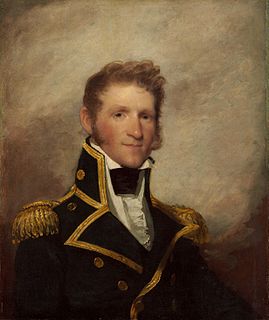 W
WThomas Macdonough, Jr. was an early-19th-century Irish-American naval officer noted for his roles in the first Barbary War and the War of 1812. He was the son of a revolutionary officer, Thomas Macdonough, Sr. who lived near Middletown, Delaware. He was the sixth child from a family of ten siblings and was raised in the countryside. He entered naval life at an early age, receiving a midshipman's commission at the age of sixteen. Serving with Stephen Decatur at Tripoli, he was a member of "Preble's Boys", a select group of U.S. naval officers who served under the command of Commodore Preble during the First Barbary War. Macdonough achieved fame during the War of 1812, commanding the American naval forces that defeated the British navy at the Battle of Lake Champlain, part of the larger Battle of Plattsburgh, which helped lead to an end to that war.
 W
WCharles Morris was a United States naval officer and administrator whose service extended through the first half of the 19th century.
 W
WCommodore Alexander Murray was an officer who served in the Continental Navy, the Continental Army, and later the United States Navy, during the American Revolutionary War, the Quasi-War with France and the First Barbary War in North Africa.
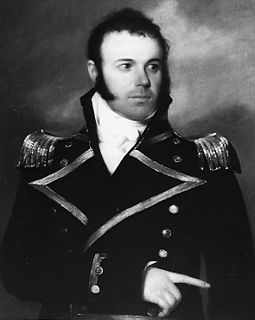 W
WDaniel Todd Patterson was an officer in the United States Navy during the Quasi-War with France, the First Barbary War, and the War of 1812.
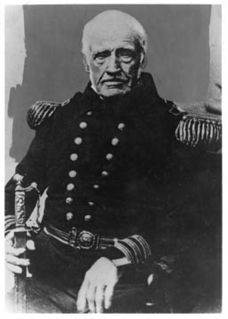 W
WJohn Percival, known as Mad Jack Percival, was a celebrated officer in the United States Navy during the Quasi-War with France, the War of 1812, the campaign against West Indies pirates, and the Mexican–American War.
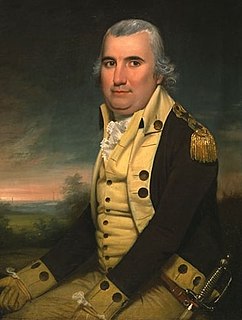 W
WCharles Cotesworth Pinckney was an early American statesman of South Carolina, Revolutionary War veteran, and delegate to the Constitutional Convention. He was twice nominated by the Federalist Party as its presidential candidate in 1804 and 1808, losing both elections.
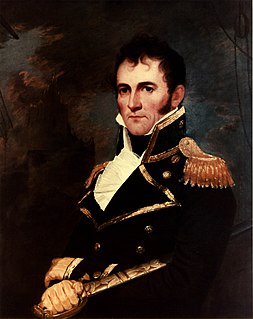 W
WDavid Porter was an officer in the United States Navy in the rank of captain and the honorary title of commodore. Porter commanded a number of U.S. naval ships, including the famous USS Constitution. He saw service in the First Barbary War, the War of 1812 and in the West Indies. On July 2, 1812, Porter hoisted the banner "Free trade and sailors' rights" as captain of USS Essex. The phrase resonated with many Americans. Porter was later court martialed; he resigned and then joined and became commander-in-chief of the Mexican Navy.
 W
WEdward Preble was a United States naval officer who served with great distinction during the 1st Barbary War, leading American attacks on the city of Tripoli and forming the officer corps that would later lead the U.S. Navy in the War of 1812.
 W
WJohn Rodgers was a senior naval officer in the United States Navy who served under six presidents for nearly four decades during its formative years in the 1790s through the late 1830s, committing the bulk of his adult life to his country. His service took him through many operations in the Quasi-War with France, both Barbary Wars in North Africa and the War of 1812 with Britain. As a senior officer in the young American navy he played a major role in the development of the standards, customs and traditions that emerged during this time. Rodgers was, among other things, noted for commanding the largest American squadron in his day to sail the Mediterranean Sea. After serving with distinction as a lieutenant he was soon promoted directly to the rank of captain. During his naval career he commanded a number of warships, including USS John Adams, the flagship of the fleet that defeated the Barbary states of North Africa. During the War of 1812 Rodgers fired the first shot of the war aboard his next flagship, USS President, and also played a leading role in the recapture of Washington D.C. after the capital was burned by the British, while also having to endure his own hometown and house burned and his family displaced. Later in his career he headed the Board of Navy Commissioners and served briefly as Secretary of the Navy. Following in his footsteps, Rodgers' son and several grandsons and great-grandsons also became commodores and admirals in the United States Navy.
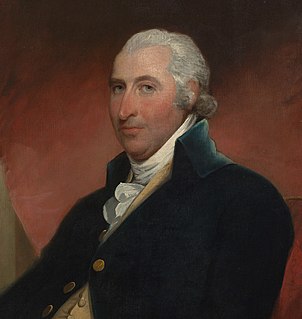 W
WJohn Shaw was an Irish-born American offcer in the United States Navy.
 W
WCommodore Arthur Sinclair was an early American naval hero, who served in the U.S. Navy during the Quasi-War with France, the First Barbary War and in the War of 1812. His three sons also served in the Navy; they resigned in 1861, however, to serve in the Confederate Navy.
 W
WRichard Somers was an officer of the United States Navy, killed during an assault on Tripoli during the First Barbary War.
 W
WAndrew Sterett [8] was an officer in the United States Navy during the nation's early days. He saw combat during the Quasi-War with France and in the Barbary Wars, commanding the schooner USS Enterprise in both conflicts.
 W
WCharles Stewart was an officer in the United States Navy who commanded a number of US Navy ships, including USS Constitution. He saw service during the Quasi War and both Barbary Wars in the Mediterranean along North Africa and the War of 1812. He later commanded the navy yard in Philadelphia and was promoted to become the Navy's first flag officer shortly before retiring. He was promoted to rear admiral after he retired from the Navy. He lived a long life and was the last surviving Navy captain who had served in the War of 1812.
 W
WThomas Tingey was a commodore of the United States Navy. Originally serving in the British Royal Navy, Tingey later served in the Continental Navy. Tingey served with distinction during the Quasi-War and served as the commandant of the navy yard until his death.
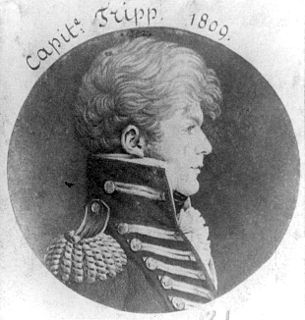 W
WJohn Trippe was an officer in the United States Navy during the Quasi-War with France and the First Barbary War.
 W
WThomas Truxtun was an American naval officer after the Revolutionary War, when he served as a privateer, who rose to the rank of commodore in the late eighteenth century and later served in the Quasi-War with France. He was one of the first six commanders appointed to the new US Navy by President Washington. During his naval career he commanded a number of famous U.S. naval ships, including USS Constellation and USS President. Later in civilian life he became involved with politics and was also elected as a sheriff.